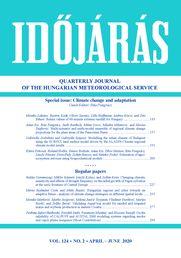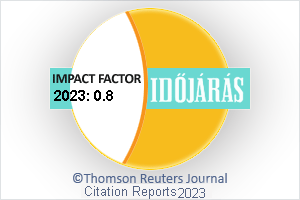IDŐJÁRÁS - angol nyelvű folyóirat
Vol. 124, No. 2 * Pages 143–309 * April - June 2020
 |
Special issue: Climate change and adaptation |
 letöltés [pdf: 3571 KB]
letöltés [pdf: 3571 KB]
Estimation of agro-ecosystem services using biogeochemical models
Klára Pokovai, Roland Hollós, Emese Bottyán, Anna Kis, Tibor Marton, Rita Pongrácz, László Pásztor, Dóra Hidy, Zoltán Barcza, and Nándor Fodor
DOI:10.28974/idojaras.2020.2.4 (p. 209–)
Klára Pokovai, Roland Hollós, Emese Bottyán, Anna Kis, Tibor Marton, Rita Pongrácz, László Pásztor, Dóra Hidy, Zoltán Barcza, and Nándor Fodor
DOI:10.28974/idojaras.2020.2.4 (p. 209–)
IDŐJÁRÁS folyóirat

Az IDŐJÁRÁS a HungaroMet Nonprofit Zrt. negyedévenként megjelenő angol nyelvű folyóirata
Megrendelhető a journal.idojaras@met.hu címen.
A szerzőknek szánt útmutató itt olvasható.
Megrendelhető a journal.idojaras@met.hu címen.
A szerzőknek szánt útmutató itt olvasható.









